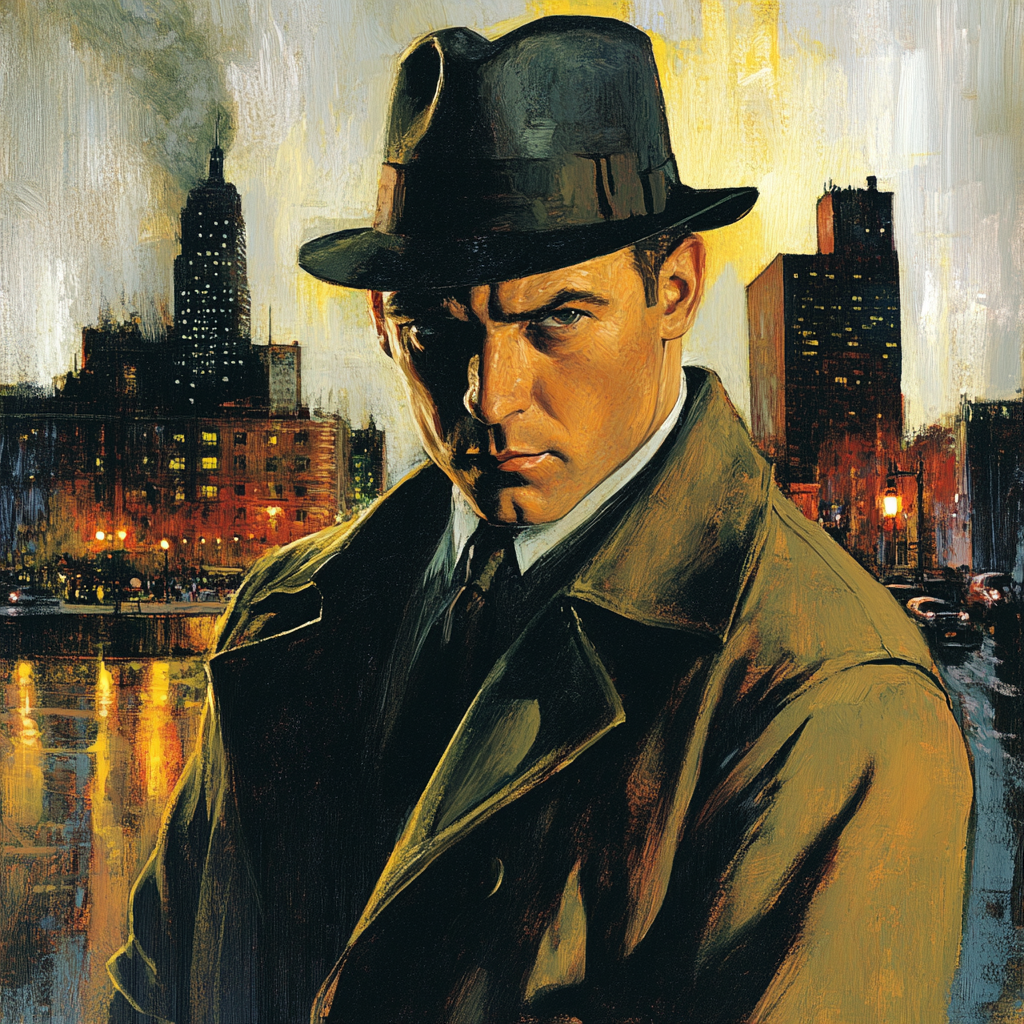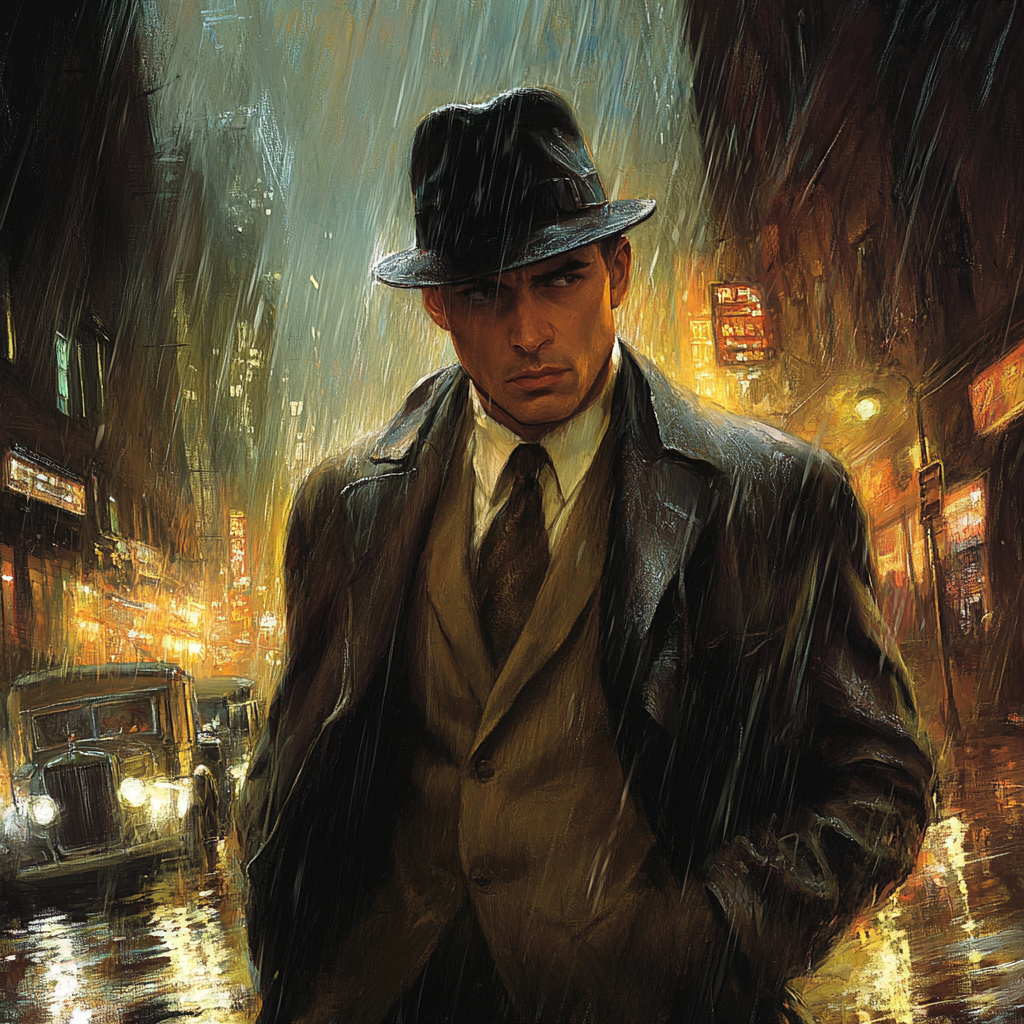Disclaimer: This post contains affiliate links. This means I may earn a commission should you choose to sign up for a program or make a purchase using my link.
Detective stories have long captivated readers, offering the thrill of a mystery solved and the satisfaction of an intricate puzzle unraveled. At the heart of any great mystery novel is a compelling sleuth, someone whose intelligence, quirks, and determination to keep readers invested in both the character and the case. But crafting the perfect detective is no small feat. An ideal detective needs to be clever, distinctive, and relatable, someone readers want to follow into the murky waters of criminal investigation.
Whether you’re working on a hard-boiled detective in a gritty noir or a cozy mystery investigator in a quaint small town, certain core elements help create a memorable and effective sleuth. In this post, we’ll explore how to develop a detective who is as intriguing as the cases they solve, covering essential traits, personal challenges, and the role of setting in shaping your sleuth’s identity.

1. Start with Strong Core Traits
A great detective is memorable and multifaceted. Begin by establishing their essential characteristics—traits that will define how they approach each case and navigate the world around them. Ideally, your detective should be both competent and flawed, a combination that keeps readers intrigued and makes them more realistic.
Key Core Traits:
- Intelligence: A detective’s primary asset is their mind. Whether they’re intuitive or analytical, make sure they have a keen ability to notice details, connect disparate information, and draw accurate conclusions.
- Curiosity: Curiosity drives detectives to dig deeper, even when others want to give up or accept straightforward answers.
- Determination or Tenacity: A good detective doesn’t give up, even when the odds are stacked against them.
- Integrity (or Lack Thereof): Some detectives abide by a strict code of ethics, while others bend the rules. Defining your detective’s moral compass will shape their interactions with other characters and their approach to justice.
While these traits form the foundation of a strong detective, what makes them truly compelling is how these traits manifest in action. Rather than telling readers that a detective is “smart,” show it through their actions, decisions, and ability to solve complex puzzles that others cannot.
2. Give Them a Unique Skill or Perspective
A unique skill or distinctive perspective can set your detective apart from others in the genre. This might be a specialized area of expertise, such as psychology, forensic science, or art history, or an unusual method of investigation that distinguishes them.
Ideas for Unique Skills or Perspectives:
- Scientific Expertise: A background in chemistry, biology, or forensic science allows the detective to interpret physical evidence.
- Psychological Insight: A detective who understands human behavior can pick up on subtle cues and motivations.
- Special Knowledge of a Subculture: Familiarity with a specific world, like the art community or professional sports, can lend insight into cases related to those fields.
- Physical Acumen: Physical skills, such as martial arts or survival training, might allow them to handle dangerous situations with confidence.
Think about how their background might inform their perspective, and use this specialized knowledge to give them an edge that others lack. This unique skill should feel organic to their character and play a role in solving the mystery, making your detective both effective and memorable.

3. Develop a Distinctive Personality
A detective’s personality should be as memorable as their case-solving abilities. From Hercule Poirot’s obsessive tidiness to Sherlock Holmes’s aloofness, iconic sleuths often have strong personality traits that make them stand out.
Personality Traits to Consider:
- Eccentricities or Quirks: Whether it’s a distinctive way of dressing, a love for a certain food, or a particular morning routine, quirks make a detective more memorable and human.
- Sense of Humor (or Lack of One): A detective’s humor, or their strict no-nonsense attitude, can add a dimension to their character and make them more relatable.
- Flaws and Vulnerabilities: Readers often connect with a detective who feels human. Give them vulnerabilities—maybe they’re impatient, struggle with authority, or have unresolved personal issues.
Their personality traits shouldn’t feel arbitrary; instead, they should contribute to how they approach cases, build (or destroy) relationships, and respond to challenges. A well-defined personality brings authenticity to the character, making the reader feel like they’re following a real person rather than a cardboard cutout detective.
4. Introduce Personal Challenges or Flaws
Perfection is boring, and even the most brilliant detective needs personal struggles. Flaws and challenges bring complexity and make the character relatable, as readers witness them struggle, grow, and even make mistakes. These weaknesses can also add layers to the mystery, particularly if they affect the detective’s judgment or ability to investigate.
Examples of Personal Challenges or Flaws:
- Addiction or Vices: The classic trope of the hard-drinking detective, like Raymond Chandler’s Philip Marlowe, can add gritty realism, but it doesn’t have to be alcohol—consider a coffee obsession, gambling problem, or other addictive behaviors.
- Relationship Issues: Personal relationships can suffer because of a detective’s obsession with their work, creating a tension between personal and professional life.
- Emotional Scars or Trauma: A detective haunted by a past failure or tragedy may have a unique perspective, but also a bias that influences their work.
- Impatience or Temper: A detective who struggles with authority, easily loses patience, or has a quick temper may alienate those around them, complicating their investigations.
Giving your detective a flaw adds richness to the story, especially when that flaw affects the case. Subplots can explore this complexity, making the character’s journey as engaging as the central mystery.

5. Create a Memorable Backstory
A detective’s past plays a huge role in who they are today. Their backstory can provide motivation, fuel grudges, or even inform how they view justice. Perhaps they’re driven by a past tragedy, like the unsolved disappearance of a sibling, or they have a personal connection to crime because of a history in law enforcement or a tumultuous family background.
Tips for Crafting an Effective Backstory:
- Keep It Relevant: Ensure that the backstory ties into their work or personality in meaningful ways, rather than simply adding flavor.
- Include a Mystery of Their Own: A detective with an unresolved question in their past is intriguing. It gives them a personal stake in solving mysteries and drives their fascination with uncovering the truth.
- Use It to Inform Motivations: The detective’s past should shape their view of justice, ethics, or relationships. Maybe they have a soft spot for victims or despise authority figures based on their own experiences.
An interesting backstory makes a detective feel real and creates opportunities for character development throughout the story, enhancing the narrative with depth and relatability.
6. Build Dynamic Relationships
Great detectives rarely operate in isolation. The relationships they form with others—whether allies, adversaries, or even suspects—add emotional depth and offer readers insights into the detective’s character. These relationships can provide conflict, humor, or support, and they often give readers a break from the intensity of the main investigation.
Relationships to Develop:
- Sidekick or Assistant: Many famous detectives have sidekicks who act as a sounding board, provide emotional balance, or offer skills the detective lacks. Consider the classic Holmes-Watson dynamic or Hercule Poirot’s companions.
- Rival or Adversary: A rival, whether in the police force or among the criminal underworld, can serve as a foil to the detective and inject tension into the story.
- Mentor or Confidant: A mentor figure or trusted friend adds warmth and provides a place for the detective to show vulnerability.
- Romantic Interest: A romantic subplot can add stakes and complications, especially if the love interest is involved in the case or has divided loyalties.
Dynamic relationships make your detective’s world feel authentic and create subplots that deepen the story. Relationships can offer opportunities for humor, conflict, and empathy, making your detective more three-dimensional.

7. Set Your Detective in a Unique Environment
The setting plays a vital role in shaping your detective’s character and the type of mysteries they solve. A sleuth’s environment influences the tone of the story, the nature of the crimes, and the detective’s methods.
Types of Settings to Consider:
- Urban Noir: The gritty streets of a big city provide ample opportunity for complex, dark mysteries, often involving organized crime or corruption.
- Small-Town or Rural Setting: Cozy mysteries or rural settings allow for quirky characters, tight-knit communities, and secrets lurking under an idyllic facade.
- Historical Time Period: A historical setting adds flavor, restrictions, and challenges that shape the detective’s approach to investigation.
- Fantasy or Sci-Fi Worlds: In speculative fiction, detectives can have access to unique investigative tools, magical abilities, or futuristic technologies, setting the stage for imaginative mysteries.
The setting should complement the detective’s personality and enhance the atmosphere of the story. Think of how the environment will affect the detective’s character and the challenges they face, making both the setting and the detective feel more vivid and integral to the narrative.
8. Make the Detective’s Methods Distinctive
How your detective solves cases sets them apart as much as their personality or backstory. Perhaps they use unorthodox methods, such as blending in with the local criminal element, relying on intuition over evidence, or going undercover in elaborate disguises.
Ideas for Unique Investigative Methods:
- Scientific Method: A detective who relies heavily on logic, deduction, and evidence-based reasoning.
- Gut Instinct: Some detectives trust intuition and instinct, seeing patterns or clues that others miss.
- Psychological Manipulation: A sleuth who understands human psychology can use it to get into the minds of suspects or witnesses.
- Unusual Tools or Techniques: Whether it’s tarot cards, forensic gadgets, or even unconventional disguises, give your detective unique tools that make their investigations distinct.
The way a detective approaches a case reveals their personality and adds another layer of intrigue to the mystery. This method should feel authentic to who they are and enhance their credibility as a sleuth.
Wrap Up
Creating an interesting detective requires careful attention to character development, distinctive personality traits, and intriguing backstory. By giving your sleuth a mix of intelligence, flaws, unique skills, and dynamic relationships, you can create a memorable character who engages readers beyond the mystery they’re solving. A well-rounded detective not only solves crimes but invites readers into their world, giving them a reason to stay invested from the first page to the last.
Now, it’s your turn to bring your detective to life. Consider their setting, their relationships, and the skills that make them unique. With a little imagination and these essential elements, you’ll craft a sleuth that readers will want to follow through every twist, turn, and shocking revelation. Let us know in the comments what makes your detective stand out, or share a memorable fictional sleuth who’s inspired you.
As always, Happy Writing!

Newsletter Sign-Up